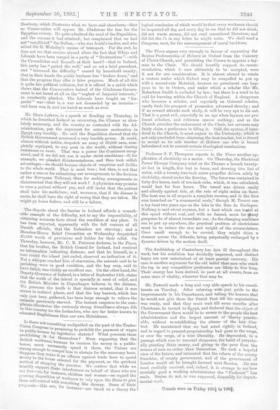Is there not something undignified on the part of the
'trades- Union Congress in proposing to prohibit the payment of wages in public-houses by legislative statute ? What prevents them prohibiting it for themselves P Even supposing that the British workman, because he receives his money in a public. house, must necessarily spend it there, the Unions are strong enough to compel him to abstain for the necessary hour. Suppose they make it an offence against trade laws to spend money in the house selected for the payment, as the quickest method of stopping the practice. We confess that while we heartily support State interference on behalf of those who are not free—as, fer instance, children and women—we regard the growing disposition of workmen to rely upon the State to give them self-control with something like dismay. Some of their proposals—this one, for instance—are based on a theory the
logical conclusion of which would be that every workman should be inspected all day and every day to see that he did not drink, did not waste mouey, did not read sensational literature, and did dot the i's in any letter he might write. We shall need a Congress, next, for the encouragement of moral backbone.


































 Previous page
Previous page